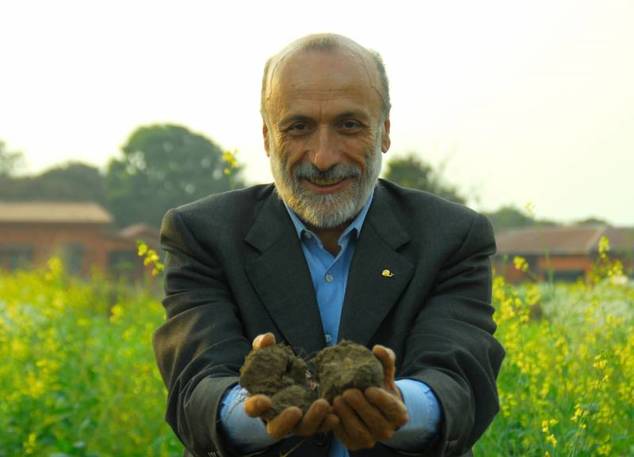


We caught up with Carlo Petrini at Eataly New York, where he was presenting his latest book, to know more about his preoccupations, his dreams, and his activity.
How did Slow Food come about?
It began as an association involved in food culture and over the years it grew into aninternational movement in 170 countries, thanks in part to Slow Food’s partner network, Terra Madre. It’s a network of farmers, fishermen, wanderers and cultivators from every corner of the world working to defend biodiversity. Slow Food in the United States is a beautiful organization that includes over 150 divisions and 50,000 members. But we’ve still got a lot of ground to cover.
You just published a new book Loving the Earth. It is subtitled “Dialogues on the Future of Our Planet. What’s it about?
It’s a series of interviews with a range of people I love and greatly admire. There are iconic figures such as Wendell Berry, Joseph Stiglitz and Alice Waters – also vice president of Slow Food – people who have contributed to changing the food culture.
These are discussions that have developed alongside Terra Madre and Slow Food.
Many of the people in the book have gone on to become instructors at the University of Gastronomic Sciences, which you started in Pollenzo, Piedmont. Tell us about it.
The idea behind the University of Gastronomic Sciences is to untether gastronomy from the spectacular and consumerist element. That’s not to say that element is wrong, actually it’s fine, but it can’t be just that. We’re in a dramatic situation: it’s like we’re onboard the Titanic grinding toward an iceberg that could drown the ship. Our message isn’t negative. On the contrary, if we understand how to receive the message, we can change the situation and divert the ship’s course. We need a lot of assistance, political activism, a paradigm shift. In some places we’ve seen this paradigm shift. But it’s not enough, and that’s why we need to reinforce it. There are people dying of hunger and there’s also an incredible amount of waste: over 40% of food is thrown away. There are wars fueled by bellicose industries that get us nowhere. That’s the side that makes the fake food industry seem ridiculous.
Can you tell us about Slow Food and Terra Madre’s “Ten Thousand Gardens in Africa” project?
For 10 years, Africa has been the victim of “land grabbing.” That means that millions of acres are being acquired for ridiculous prices to produce food not for Africans but for countries like China and the Arab Emirates. They’re expropriating the lifeblood of millions of Africans. This situation—alongside war and poverty—has sparked a major exodus of young people who have not only been robbed of their future but are in life-threatening situations. This is a distinguishing feature of neo-colonialist politics. It’s more violent than the colonialism of the past, and we have to respond. Slow Food launched the “Ten Thousand Gardens in Africa” campaign, but it’s a drop in the bucket. The gardens are run by young African farmers. Such organizations constitute a new African leadership. I’m hoping it will really come to fruition.
Educating children must be very important in this endeavor.
They’re the citizens of the future. If we want to get beyond the current food industry, we have to begin by educating children, by recreating intergenerational cohesion.
I hear you have a new project cooking: the Slow Food Planet project. Can you fill us in?
We have to embrace those who are doing honest work. That’s exactly why Slow Food Planet was created. In the next three years, by 2018, the app will provide information for travelers across the world. We recommend restaurants that partner with farmers and purchase local foods, indicate farmer’s markets, and put people in direct contact with producers. It will be a guide for honest travel, providing information that gives people the opportunity to pass through cities with a trusted friend. Because we want everyone to get that chance, the app is free and simple.
Let’s conclude with this year’s Expo, which just opened in Milan. The theme of the Expo is “Feeding the Planet,” and the Slow Food movement has its own exhibit space there. But at the same time, you raised some concerns. Why?
Yes, I was among the first to believe in the potential of the Expo. One of the major issues today is that people are choosing to ignore the fact that our current practices are not sustainable, that we are heading toward disaster. Unfortunately however, you see this attitude reflected even at Expo Milan. In order to sell tickets and satisfy international expectations, the organizers of the event are focusing too much on the touristic aspect and on turning food into a spectacle.
Betting on widespread appreciation for stereotypical Italian food is not enough. We need to use the Expo as an opportunity to truly make a change. This opportunity should not be missed.
Source URL: http://newsite.iitaly.org/magazine/dining-in-out/articles-reviews/article/changing-food-industry-changing-system-now
Links
[1] http://newsite.iitaly.org/files/carlopetrinisloowfoodmovement1435956640jpg